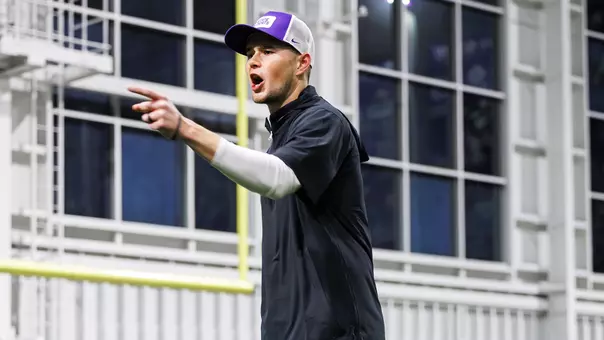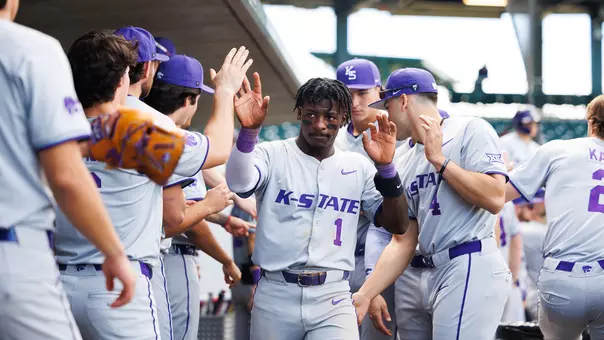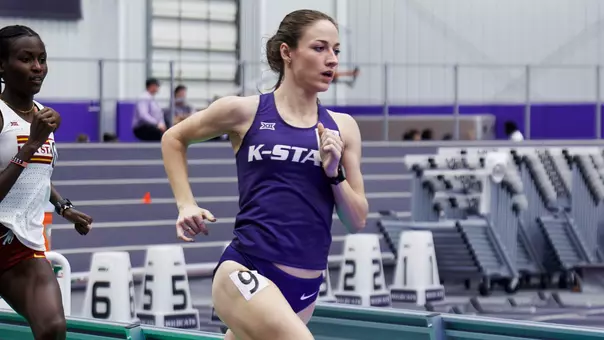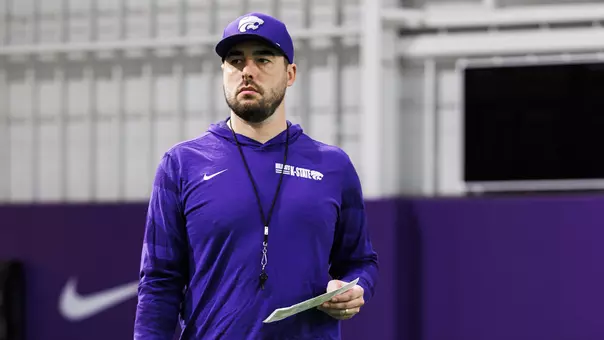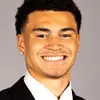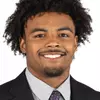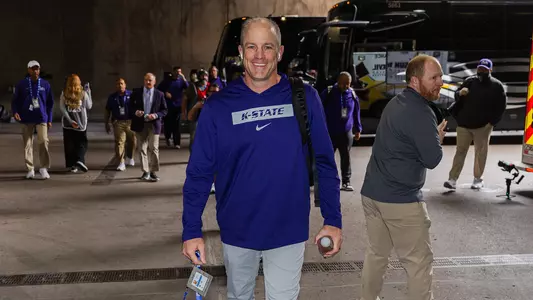
Fun, Challenging and Rewarding
Feb 18, 2025 | Football, Sports Extra
By: D. Scott Fritchen
Matt Wells is eager for the challenge.
Wells, who originally joined Chris Klieman's staff last January 2024 as Kansas State's associate head coach/co-offensive coordinator/quarterbacks coach, was promoted this February 10 to become offensive coordinator and primary play caller, succeeding Conor Riley, who became offensive line coach for the Dallas Cowboys.
Spending the past year at K-State has gotten Wells "back to my roots" as a college coach, adding that "(I) just became more aware of my desire and hope to dive into these dudes' lives and help be a mentor and help be someone that can go help them chase a dream that they cannot absolutely do by themselves."
Now he enters a new role in heading up an offense that returns quarterback Avery Johnson, Rate Bowl MVP running back Dylan Edwards, wide receiver Jayce Brown and a dangerous bunch of tight ends that will also welcome Linkon Cure.
Already, Wells been busy observing, plotting and preparing.
"(I'll) start with the big vision of what we want to look like in my mind and in my thoughts, which isn't going to be a whole lot of wholesale changes," he says. "This place has been very, very successful and the system has been very, very successful to Kansas State and has been recruited to."
Wells adds: "Hopefully we throw to score, and we run to win. I've always said that. Man, I want us to be exciting, I want us to be unpredictable."
He loves his players. He loves the camaraderie of the offensive coaching staff. He doesn't know what offensive play call he'll dial up first in the Wildcats' season opener against Iowa State in the Aer Lingus College Football Classic on August 23.
That's OK. It's February. His first week as OC. This is just the beginning.
Wells sat down with K-State Sports Extra's D. Scott Fritchen to discuss his new role as K-State offensive coordinator:

D. Scott Fritchen: When did you find out you were named K-State offensive coordinator? Where were you and what were you doing at the time?
Matt Wells: I remember exactly where I was. I was in San Clemente at a place there, and Jen and I were out there hanging out for five days. Coach gave us a few days after signing day, which we didn't sign anybody, and I was in California. Funny, I was in the same place where I was when I received the phone call from Coach about the finality of joining K-State last January.
Fritchen: So, K-State head coach Chris Klieman calls you. What did he say and what did you say?
Wells: He told me Conor Riley took the job with the Cowboys, and he said, "Let's ride." And I said, "Let's go."
Fritchen: What is the first order of duty you did or are currently doing as offensive coordinator?
Wells: No order of anything but everything now would be to start with the big vision of what we want to look like in my mind and in my thoughts, which isn't going to be a whole lot of wholesale changes. This place has been very, very successful and the system has been very, very successful to Kansas State, and has been recruited to. When I say recruited to, it mainly means we have tight ends and not a lot of places have that tight end room like we do. So, it starts with the vision by me that gets verbalized to staff and to the players. I think just spending some time around some of the linemen, especially with losing Conor, and now with the promotion of Brian Lepak – which is absolutely merited and supported by me – it's awesome.
In this transition time, I'm spending time with those guys, I'm spending time with our staff organizing and diving into cutups and diving into the season and how we're going to do it and try to be really efficient. What's the 2025 version of Wildcat offense look like? We're making broad strokes right now, but I have a pretty good feeling what we're going to look like but maybe not some of the specifics to get called yet. Then, seeing where our analysts and young coaches fit and where we can help expand their roles in creating value for our staff, but creating individual value for all of those. I've been doing that for 10 days. That's all-encompassing. I've been meeting with the quarterbacks, which is a big part of the offseason, as we all know, just in those meetings.

Fritchen: What are you looking forward to most as offensive coordinator?
Wells: I don't know if it's one specific thing. That's a good question. It's hard to pin down. I enjoy the camaraderie of the staff, and I enjoy hopefully leading, not running, but leading a room of men who care about Kansas State, and they care about their own players, and they care about what their offense looks like. We all have a piercing desire to please our head coach and to please our fan base and to represent this school the best that we can, and that means, obviously for us, it's scoring points, and I get it. It's a very scrutinized position. I'm good. I know what I stepped into. I think anytime you step into a quarterback, offensive coordinator, head coach role, you know that you're going to get too much credit when you win and too much blame when you lose, and somewhere in between lies the real truth. Always trying to push that needle somewhere in between, a little higher and higher, and through failure at times, and through adversity always, always having adversity, and how does it look?
Then you have the schematic challenge, which is a huge thing for me that I enjoy, whether you've done it with a starting quarterback that goes the whole entire year, or I've done it with your fourth-string quarterback, what do we look like? What personnel group do we play in a majority of the time that fits us best or where we have the best weapons? The use of your personnel, the use of scheme, and trying to get the best matchups you can get. That's what excites me. Trying to drill really low and really deep into what's the best routes for Jayce Brown, and what's the best ways to get Dylan Edwards the ball in space and in between the tackles. How about all our new wideouts? How to grow some of our young developmental wideouts and how to best get the ball to our tight ends. We did it really well last year in the red zone. Now that's on tape. Now people have that, so what do we play off of? Then how do we still use those guys?
A little bit different offensive line this year. We lose some starters. We lost starters last year and we looked a little different from 2023 in 2024, but yet we found ways to run the ball, and I think, man, that's the challenge, that's what gets you up in the morning, that's what brings us into the Vanier Complex is just, man, we're blessed to be here, I know that. And I'm blessed to be in this position and I'm very grateful. It's fun. It's challenging, but it's very rewarding, especially when you see the success your players have and you see them change, maybe they're changing their bodies, maybe their skill set is improving, maybe their confidence is improving. To see them rise about the challenge, that's what we're all in this profession for.

Fritchen: You served as OC at Utah State and helped them win the 2012 WAC title. Have you served as a play-caller at other stops along your career?
Wells: I'd say periodically as a head coach.
Fritchen: You talk about the schematic challenge. Describe the chess match involved in calling plays in a game and the excitement that goes along with it?
Wells: I wouldn't say excitement. I'd say it's more stress. As you're taking educated guesses and well thought out, calculated, aggressive approach toward certain things, and then being able to adapt when something changes, and they give you something you didn't think or there's a tendency or a volume of stuff that you didn't anticipate, and you have to change. That's always the cat-and-mouse game we get into every Saturday.
Fritchen: Who are some play-callers you've admired over the years?
Wells: I'd start with the two guys I played for at Utah State because I have tremendous respect for both of them — Jim Zorn and Bobby Petrino. I'd be hard-pressed to say I've been around any better than those two. Ken Niumatalolo was a great play-caller at the Naval Academy when we ran the option and to see how he set stuff up and was setting up the triple-option and the run game and that was completely different for me coming out of Utah State as a young coach, but I admire Kenny quite a bit. I think I've been around a lot as a player and coach that modeled it, but man, I think I've learned and picked up something from everybody I've been around, even some coordinators who were on our staff when I was head coach. I had four great play-callers in those nine years, and they all called the game well.
Fritchen: What does a Matt Wells offense look like?
Wells: Well, hopefully we throw to score, and we run to win. I've always said that. Man, I want us to be exciting, I want us to be unpredictable. I also know deep down inside when you're good at certain things within the run game or certain things in the passing game, you have tendencies, and some people, the defense or the fans, know it's coming. When you can do it better than they can defend it, there's a successful outlook to that as well. Being completely unpredictable, sometimes you're not worth a flip, because you don't do things well enough as players over and over again to get really good at something.
I see us as being a team that will always run the ball, we're going to have an element of quarterback run game, the RPO world will absolutely be a piece of it, taking shots and being aggressive and moving the pocket with Avery Johnson, and I think what it really comes down to more than anything is what can our guys execute really well. As a young player, I learned FTS "FEED THE STUD" really, really early. That's getting the ball into the hands of your playmakers. We have multiple studs, and there needs to be and whether it's the run game, the perimeter touch game, down-the-field passing game, what do our guys do well and try to do more of it. What do they not do well and how much are we going to improve on and how much are we going to eliminate and say, "We're not going to do that."
That's the balance of being a play caller, it's Monday through Friday, and it's in the room, and that's very much a collective effort. Often times I think the play caller gets way too much credit, to be honest with you. We're all in it together. There are often times, just like last year, we made decisions on calls during the week, and how to set things up and whether it's situational, third down, red zone, low red, backed up, first play of the drive, whatever, those are calls made during the week, not just nonchalantly during the game. They're thought out throughout the week. Play-calling is a collective effort during the week. One guy has to verbalize it on gameday, and you have to set things up and have a feel for it. I know there's an art to it as well.

Fritchen: Describe your partnership with Avery Johnson the first year and where it can go this next year.
Wells: A really good start but as we all look at it, I see the records broken, I see the stats that are really good, I see his stats compared to national and other quarterbacks, and I am proud of the start, simply put. I'd tell you we have more to go. We have more to work on. He'll be the first to tell you and I'll be the first to tell you we look at things through a very, very critical eye. Whether it's footwork, I think we have to get better at deep-ball accuracy. Some of that is footwork, and we're in a deep dive and we're still in the middle of dissecting every single incompletion and figuring out why. There are answers why. Sometimes it's footwork, sometimes it's bad eyes, sometimes his bad eyes might be a result of bad coaching, OK? And every one of those incompletions are my incompletions, and that's how personal I take it. Man, he and I are in the middle of doing that, and it's awesome. It's fun, it's challenging. Can we cut the incompletions in half? If we cut them in half, he'll have a freaking great year. That's the goal, but man, now it's the journey.
It's all about the journey, and every day, and how does he get better. It's physical and gaining weight for him, and there's a mental component to it. We're so much farther along than we were a year ago at this point, and knowing him a little bit better, everyday, man, I'll tell you he's driven, he's got a steely focus, he is becoming a better leader, and I think that he would be the first to tell you he isn't anywhere close to a finished product yet. But he is a super-talented kid who is super coachable, and as long as he stays moldable and coachable and with a great amount of humility, the sky's the limit for him.
Fritchen: You mentioned "FTS" — Feed The Studs. Who are the studs?
Wells: I'll let you know at the end of spring ball. I have a pretty good idea, though. I have a pretty good idea.
Fritchen: There have been several new faces who have entered the fold from the transfer portal. Who are some playmakers specifically you are excited about?
Wells: Well, when you ask specifically about the transfer portal, really, we have five skill kids from the transfer portal. We have one running back – and I'm going to count the junior college – and then the three wideouts, and all five of those, my expectation is all five of them are absolutely contributing to the Wildcats. To what level, I don't know yet. Need to see them work and continue to invest, and a lot of that will be their investment throughout this offseason, the spring and summer. But they certainly all have gotten entrenched down in the weight room with Coach Tru, and they're getting thrown in the grease and trying to figure out the Wildcat Way.
Fritchen: What's the first offensive play you are going to call in 2025?
Wells: I don't know yet.
Fritchen: What have you learned most about yourself during this past year at Kansas State?
Wells: I don't know if I learned it or just became more aware of my desire and hope to dive into these dudes' lives and help be a mentor and help be someone that can go help them chase a dream that they cannot absolutely do by themselves. Being in an assistant's role and being with these quarterbacks has probably gotten me back to my roots and just the love and the challenge of their development, a scheme, a camaraderie with the guys in the offensive staff room, I just probably have appreciated that move than I probably have in a long time.
Matt Wells is eager for the challenge.
Wells, who originally joined Chris Klieman's staff last January 2024 as Kansas State's associate head coach/co-offensive coordinator/quarterbacks coach, was promoted this February 10 to become offensive coordinator and primary play caller, succeeding Conor Riley, who became offensive line coach for the Dallas Cowboys.
Spending the past year at K-State has gotten Wells "back to my roots" as a college coach, adding that "(I) just became more aware of my desire and hope to dive into these dudes' lives and help be a mentor and help be someone that can go help them chase a dream that they cannot absolutely do by themselves."
Now he enters a new role in heading up an offense that returns quarterback Avery Johnson, Rate Bowl MVP running back Dylan Edwards, wide receiver Jayce Brown and a dangerous bunch of tight ends that will also welcome Linkon Cure.
Already, Wells been busy observing, plotting and preparing.
"(I'll) start with the big vision of what we want to look like in my mind and in my thoughts, which isn't going to be a whole lot of wholesale changes," he says. "This place has been very, very successful and the system has been very, very successful to Kansas State and has been recruited to."
Wells adds: "Hopefully we throw to score, and we run to win. I've always said that. Man, I want us to be exciting, I want us to be unpredictable."
He loves his players. He loves the camaraderie of the offensive coaching staff. He doesn't know what offensive play call he'll dial up first in the Wildcats' season opener against Iowa State in the Aer Lingus College Football Classic on August 23.
That's OK. It's February. His first week as OC. This is just the beginning.
Wells sat down with K-State Sports Extra's D. Scott Fritchen to discuss his new role as K-State offensive coordinator:

D. Scott Fritchen: When did you find out you were named K-State offensive coordinator? Where were you and what were you doing at the time?
Matt Wells: I remember exactly where I was. I was in San Clemente at a place there, and Jen and I were out there hanging out for five days. Coach gave us a few days after signing day, which we didn't sign anybody, and I was in California. Funny, I was in the same place where I was when I received the phone call from Coach about the finality of joining K-State last January.
Fritchen: So, K-State head coach Chris Klieman calls you. What did he say and what did you say?
Wells: He told me Conor Riley took the job with the Cowboys, and he said, "Let's ride." And I said, "Let's go."
Fritchen: What is the first order of duty you did or are currently doing as offensive coordinator?
Wells: No order of anything but everything now would be to start with the big vision of what we want to look like in my mind and in my thoughts, which isn't going to be a whole lot of wholesale changes. This place has been very, very successful and the system has been very, very successful to Kansas State, and has been recruited to. When I say recruited to, it mainly means we have tight ends and not a lot of places have that tight end room like we do. So, it starts with the vision by me that gets verbalized to staff and to the players. I think just spending some time around some of the linemen, especially with losing Conor, and now with the promotion of Brian Lepak – which is absolutely merited and supported by me – it's awesome.
In this transition time, I'm spending time with those guys, I'm spending time with our staff organizing and diving into cutups and diving into the season and how we're going to do it and try to be really efficient. What's the 2025 version of Wildcat offense look like? We're making broad strokes right now, but I have a pretty good feeling what we're going to look like but maybe not some of the specifics to get called yet. Then, seeing where our analysts and young coaches fit and where we can help expand their roles in creating value for our staff, but creating individual value for all of those. I've been doing that for 10 days. That's all-encompassing. I've been meeting with the quarterbacks, which is a big part of the offseason, as we all know, just in those meetings.

Fritchen: What are you looking forward to most as offensive coordinator?
Wells: I don't know if it's one specific thing. That's a good question. It's hard to pin down. I enjoy the camaraderie of the staff, and I enjoy hopefully leading, not running, but leading a room of men who care about Kansas State, and they care about their own players, and they care about what their offense looks like. We all have a piercing desire to please our head coach and to please our fan base and to represent this school the best that we can, and that means, obviously for us, it's scoring points, and I get it. It's a very scrutinized position. I'm good. I know what I stepped into. I think anytime you step into a quarterback, offensive coordinator, head coach role, you know that you're going to get too much credit when you win and too much blame when you lose, and somewhere in between lies the real truth. Always trying to push that needle somewhere in between, a little higher and higher, and through failure at times, and through adversity always, always having adversity, and how does it look?
Then you have the schematic challenge, which is a huge thing for me that I enjoy, whether you've done it with a starting quarterback that goes the whole entire year, or I've done it with your fourth-string quarterback, what do we look like? What personnel group do we play in a majority of the time that fits us best or where we have the best weapons? The use of your personnel, the use of scheme, and trying to get the best matchups you can get. That's what excites me. Trying to drill really low and really deep into what's the best routes for Jayce Brown, and what's the best ways to get Dylan Edwards the ball in space and in between the tackles. How about all our new wideouts? How to grow some of our young developmental wideouts and how to best get the ball to our tight ends. We did it really well last year in the red zone. Now that's on tape. Now people have that, so what do we play off of? Then how do we still use those guys?
A little bit different offensive line this year. We lose some starters. We lost starters last year and we looked a little different from 2023 in 2024, but yet we found ways to run the ball, and I think, man, that's the challenge, that's what gets you up in the morning, that's what brings us into the Vanier Complex is just, man, we're blessed to be here, I know that. And I'm blessed to be in this position and I'm very grateful. It's fun. It's challenging, but it's very rewarding, especially when you see the success your players have and you see them change, maybe they're changing their bodies, maybe their skill set is improving, maybe their confidence is improving. To see them rise about the challenge, that's what we're all in this profession for.

Fritchen: You served as OC at Utah State and helped them win the 2012 WAC title. Have you served as a play-caller at other stops along your career?
Wells: I'd say periodically as a head coach.
Fritchen: You talk about the schematic challenge. Describe the chess match involved in calling plays in a game and the excitement that goes along with it?
Wells: I wouldn't say excitement. I'd say it's more stress. As you're taking educated guesses and well thought out, calculated, aggressive approach toward certain things, and then being able to adapt when something changes, and they give you something you didn't think or there's a tendency or a volume of stuff that you didn't anticipate, and you have to change. That's always the cat-and-mouse game we get into every Saturday.
Fritchen: Who are some play-callers you've admired over the years?
Wells: I'd start with the two guys I played for at Utah State because I have tremendous respect for both of them — Jim Zorn and Bobby Petrino. I'd be hard-pressed to say I've been around any better than those two. Ken Niumatalolo was a great play-caller at the Naval Academy when we ran the option and to see how he set stuff up and was setting up the triple-option and the run game and that was completely different for me coming out of Utah State as a young coach, but I admire Kenny quite a bit. I think I've been around a lot as a player and coach that modeled it, but man, I think I've learned and picked up something from everybody I've been around, even some coordinators who were on our staff when I was head coach. I had four great play-callers in those nine years, and they all called the game well.
Fritchen: What does a Matt Wells offense look like?
Wells: Well, hopefully we throw to score, and we run to win. I've always said that. Man, I want us to be exciting, I want us to be unpredictable. I also know deep down inside when you're good at certain things within the run game or certain things in the passing game, you have tendencies, and some people, the defense or the fans, know it's coming. When you can do it better than they can defend it, there's a successful outlook to that as well. Being completely unpredictable, sometimes you're not worth a flip, because you don't do things well enough as players over and over again to get really good at something.
I see us as being a team that will always run the ball, we're going to have an element of quarterback run game, the RPO world will absolutely be a piece of it, taking shots and being aggressive and moving the pocket with Avery Johnson, and I think what it really comes down to more than anything is what can our guys execute really well. As a young player, I learned FTS "FEED THE STUD" really, really early. That's getting the ball into the hands of your playmakers. We have multiple studs, and there needs to be and whether it's the run game, the perimeter touch game, down-the-field passing game, what do our guys do well and try to do more of it. What do they not do well and how much are we going to improve on and how much are we going to eliminate and say, "We're not going to do that."
That's the balance of being a play caller, it's Monday through Friday, and it's in the room, and that's very much a collective effort. Often times I think the play caller gets way too much credit, to be honest with you. We're all in it together. There are often times, just like last year, we made decisions on calls during the week, and how to set things up and whether it's situational, third down, red zone, low red, backed up, first play of the drive, whatever, those are calls made during the week, not just nonchalantly during the game. They're thought out throughout the week. Play-calling is a collective effort during the week. One guy has to verbalize it on gameday, and you have to set things up and have a feel for it. I know there's an art to it as well.

Fritchen: Describe your partnership with Avery Johnson the first year and where it can go this next year.
Wells: A really good start but as we all look at it, I see the records broken, I see the stats that are really good, I see his stats compared to national and other quarterbacks, and I am proud of the start, simply put. I'd tell you we have more to go. We have more to work on. He'll be the first to tell you and I'll be the first to tell you we look at things through a very, very critical eye. Whether it's footwork, I think we have to get better at deep-ball accuracy. Some of that is footwork, and we're in a deep dive and we're still in the middle of dissecting every single incompletion and figuring out why. There are answers why. Sometimes it's footwork, sometimes it's bad eyes, sometimes his bad eyes might be a result of bad coaching, OK? And every one of those incompletions are my incompletions, and that's how personal I take it. Man, he and I are in the middle of doing that, and it's awesome. It's fun, it's challenging. Can we cut the incompletions in half? If we cut them in half, he'll have a freaking great year. That's the goal, but man, now it's the journey.
It's all about the journey, and every day, and how does he get better. It's physical and gaining weight for him, and there's a mental component to it. We're so much farther along than we were a year ago at this point, and knowing him a little bit better, everyday, man, I'll tell you he's driven, he's got a steely focus, he is becoming a better leader, and I think that he would be the first to tell you he isn't anywhere close to a finished product yet. But he is a super-talented kid who is super coachable, and as long as he stays moldable and coachable and with a great amount of humility, the sky's the limit for him.
Fritchen: You mentioned "FTS" — Feed The Studs. Who are the studs?
Wells: I'll let you know at the end of spring ball. I have a pretty good idea, though. I have a pretty good idea.
Fritchen: There have been several new faces who have entered the fold from the transfer portal. Who are some playmakers specifically you are excited about?
Wells: Well, when you ask specifically about the transfer portal, really, we have five skill kids from the transfer portal. We have one running back – and I'm going to count the junior college – and then the three wideouts, and all five of those, my expectation is all five of them are absolutely contributing to the Wildcats. To what level, I don't know yet. Need to see them work and continue to invest, and a lot of that will be their investment throughout this offseason, the spring and summer. But they certainly all have gotten entrenched down in the weight room with Coach Tru, and they're getting thrown in the grease and trying to figure out the Wildcat Way.
Fritchen: What's the first offensive play you are going to call in 2025?
Wells: I don't know yet.
Fritchen: What have you learned most about yourself during this past year at Kansas State?
Wells: I don't know if I learned it or just became more aware of my desire and hope to dive into these dudes' lives and help be a mentor and help be someone that can go help them chase a dream that they cannot absolutely do by themselves. Being in an assistant's role and being with these quarterbacks has probably gotten me back to my roots and just the love and the challenge of their development, a scheme, a camaraderie with the guys in the offensive staff room, I just probably have appreciated that move than I probably have in a long time.
Players Mentioned
K-State Men's Basketball | Postgame Press Conference at Texas Tech
Sunday, February 22
K-State Women's Basketball | Tess Heal Senior Video
Sunday, February 22
K-State Women's Basketball | Mikayla Parks Senior Video
Sunday, February 22
K-State Women's Basketball | Senior Night Ceremony 2025 - 2026 Season
Sunday, February 22
